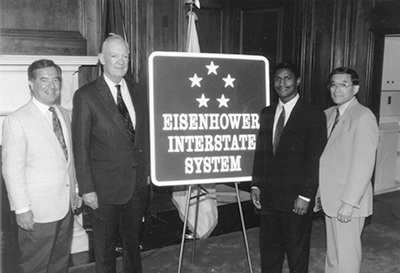One of the most distressing aspects of today’s politics is the way it has reduced the willingness of people to come together in an emergency or disaster. Even as the wildfires in Los Angeles continued to devastate people and whole communities, some congressional some Republicans pointed fingers of blame at California Democrats for the disaster. Some congressional Democrats, for their part, blamed Republicans for their inaction on climate change. Both sets of allegations contain misinformation. (For a closer look at the relationship between wildfires and climate change, see here, here, and here; for a rundown of the false claims leveled against California politicians by congressional Republicans and then-president-elect Trump, see here and here.)
This bickering is characteristic of these bitter partisan times. Levels of partisan division and animosity are higher than any time in the modern regulatory era. (I discuss why in my book.) In less bitterly divided eras, we would have come together to support the victims of natural disasters like this one. Government has always played a role in these collective responses to disaster because the free rider problem markets cannot do so satisfactorily. We see this right now with the insurance crisis in California and several other states. Sharing liability risk is getting more expensive as the climate changes, straining the financial ability of individual states most prone to disasters.
Indeed, when it comes to ensuring against risks, “bigger is better.” That is, the bigger the risk pool, the lower the cost of providing insurance. That is why national governments often get involved in pooling risk.
Health emergencies — disease and accidents — can hit anyone anywhere, with devastating financial and human consequences. Modern societies choose not to simply leave the striken to suffer and die. In the United States, Medicare and Medicaid supplement the private health insurance market, as do the rules imposed by the Affordable Care Act system. In most other developed countries, the government organizes a national health insurance risk pool that includes all of the nation’s citizens. Food, drug and product safety regulation supplements health insurance by reducing risks to human health, which in turn reduce the cost of insurance.
The same is true of weather-related risks. There are private insurance markets, but they are supplemented by government programs. After the Great Depression and the Dust Bowl devastated rural America, the national government stepped in to pool risk. Federal crop insurance, government-funded agricultural extension and soil conservation services, and various other national programs put taxpayer money behind protecting farms and farmers against the vagaries of extreme weather. Around the same time, the national government facilitated (read: helped to pay for, with taxpayer money) the electrification of rural communities which improved the lives of farm families immeasurably.
Back then very few people objected to helping out the unfortunate. Today things are different.
Today we use the Federal Emergency Management Administration (FEMA) to organize efforts to help communities hit by the natural disasters. The science of predicting hurricanes, tornadoes, wildfires, floods, and droughts has improved over time, but those predictive models are not perfect. These disasters continue to strike specific communities unpredictably, and so we as a nation try to help those who bear their costs. This public expression of empathy is a longstanding feature of modern liberal democracies.
Yet President Trump talks about eliminating FEMA. It has always true that some people make better risk-related decisions than others, and that pooling risk widely is imperfect. But with respect to rare and high-stakes misfortune, it is the kind choice.
The declining willingness of conservatives over the last few decades to support the use of government to pool risk exacerbates the pain for those afflicted by weather disasters. Like like private insurance programs, government insurance programs are strained by increasing payout costs and rising premiums. Of course, all of these problems are exacerbated by historic levels of economic inequality. It costs money to avoid risk — to live outside of flood zones, to afford increasingly expensive insurance, to weather-proof your home, etc.
I was born in 1958, the supposedly halcyon days of the Eisenhower Administration for which some cultural conservatives seem to pine these days. But that was an era when marginal income tax rate for the highest income bracket (>$400,000) was 91%, the federal budget was in kept more or less in balance, and the national government was building the interstate highway system. It doesn’t matter if you call that sort of thing “socialism” or “regulated capitalism” or any other label. It is a law of nature that societies require markets and governments to function well and cooperatively.
At this moment in U.S. history, that is not happening; and most people under-appreciate how partisan hatred (fanned by ideological and social media) is getting in the way of solving that problem. The most active partisan voters process the news in an online miasma of anger and misinformation. They dominate primary elections, and influence the behavior of elected politicians.
Refusing to pool risk or to help one’s fellow citizens risks looking heartless. So one way to try to avoid that perception is to point fingers of blame at the victims. That’s what we’re seeing today. And in the Internet era, emotional narratives influence politics much more forcefully than rational argument or evidence. An entire generation has come of age online, where it is common to label entire groups of people as evil or blameworthy, on both the right and the left.
Escaping this vicious cycle requires protecting older modes of communication, information-gathering and belief-formation that the Internet is slowly destroying. Get offline, support traditional news aimed at ideologically broad audiences, and ask your co-workers, neighbors, family and friends what they think about policy problems like climate change, and why. — David Spence



